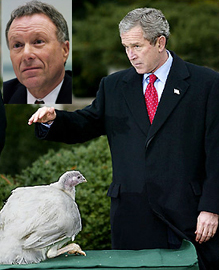MR. GIULIANI: — and he knew a crime wasn’t committed. I recommended over a thousand pardons to President Reagan when I was associate attorney general. I would see if it fit the criteria for pardon. I’d wait for the appeal. I think what the judge did today argues more in favor of a pardon —
MR. BLITZER: Thank you.
MR. GIULIANI: — because this is excessive punishment —
MR. BLITZER: All right.
MR. GIULIANI: — when you consider — I’ve prosecuted 5,000 cases —
MR. BLITZER: I’m trying to get a yes or no. (Laughter.)
MR. GIULIANI: Well, this is a very important issue. This is a very, very important — a man’s life is at stake. And the reality is, this is an incomprehensible situation. They knew who the leak was —
MR. : Say, Wolf, can I explain — (off mike) —
MR. GIULIANI: — and ultimately, there was no underlying crime involved.
MR. BLITZER: All right.
MR. ROMNEY: This is one of those situations where I go back to my record as governor. I didn’t pardon anybody as governor because I didn’t want to overturn a jury.
But in this case, you have a prosecutor who clearly abused prosecutorial discretion by going after somebody when he already knew that the source of the leak was Richard Armitage. He’d been told that. So HE went on a political vendetta.
MR. BLITZER: So is that a yes?
MR. ROMNEY: It’s worth looking at that. I will study it very closely, if I’m lucky enough to be president, and I’d keep that option open.
MR. BLITZER: Senator?
SEN. BROWNBACK: Yes. The basic crime here didn’t happen.
MR. BLITZER: All right.
SEN. BROWNBACK: What they were saying was that the identity of an agent was revealed —
MR. BLITZER: Governor?
SEN. BROWNBACK: — but that agent has to be in the field for that to be a crime. That didn’t occur.
MR. BLITZER: Governor?
MR. THOMPSON: Bill Clinton committed perjury in a grand jury — lost his law license. Scooter Libby got 30 months. To me, it’s not fair at all. But I would make sure the appeal was done properly, and then I would examine the record.
MR. BLITZER: Congressman?
REP. TANCREDO: Yes.
MR. BLITZER: Yes.
All right. We heard from all of them. (Applause.)




